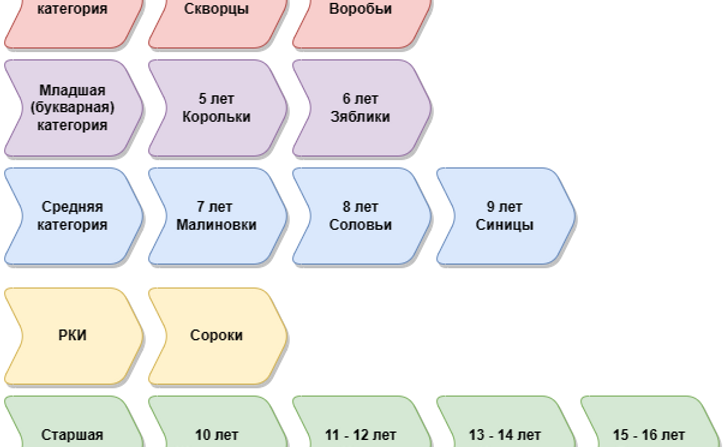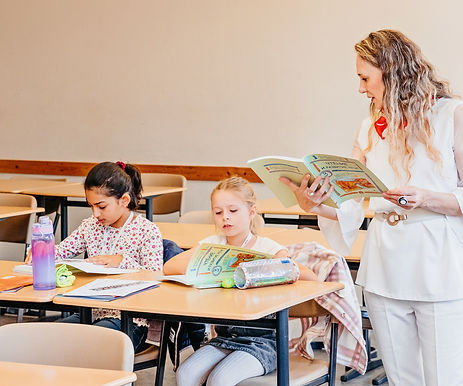Academic year 2023 - 2024

Preschool category
Fun and exciting activities in the preschool category (3-4 years) are aimed at adapting the child to the new environment. Your kid will learn to be active, independent, and communicate.
We pay great attention to the development of speech and sound pronunciation. We are working on the development of memory, attention, thinking, gross and fine motor skills.
Sculpting, drawing, designing, music and other creative activities expand your little one's imagination.
In a music lesson, children sing and dance one by one and in pairs, perform exercises with flags, sticks, bells. Positive emotions make learning easier. Musical and rhythmic exercises develop coordination, posture, orientation in space, and motor activity.
Each child develops at his own pace. Do not be upset if the baby does not succeed right away. This takes time.



Junior category
The concept of teaching multilingual children of preschool age at the Kalinka School is based on the principle of an individual approach to each student and the desire to maximize the development and improvement of the intellectual characteristics of this age category.
In 2019, to teach 5-year-old children to read, the teachers of the Kalinka School began to use the “Primer for a Smart Girl” by Elena Ageeva, which allows them to successfully develop the speech and logical thinking of students.
In the new academic year, the following directions are introduced into the curriculum for children 5-6 years old:
- logic: at the age of 5-6 years, most children are already able to master the basic logical operations (comparison, analysis, synthesis and classification). Therefore, the teachers of the younger groups of Kalinka purposefully teach the kids the skills of logical analysis, the ability to reason correctly, and find non-standard solutions. This is what makes the child truly gifted and talented, helps his studies in basic school and globally prepares him for life.
- neuro-gymnastics: neuro-gymnastics techniques help a wide range of children to concentrate and better control themselves. The provided program for young schoolchildren consists of 4 types of exercises:
1.motor (development of gross and fine motor skills);
2. cognitive (development of memory, attention, thinking;
3. respiratory;
4. exercises for self-regulation and control.
The teachers of the Kalinka School, confident in the uniqueness of each child, successfully implement the appropriate teaching methods and principles to identify and develop the abilities and talents of the school's students.



Middle category
The training program for schoolchildren (7-9 years old) takes into account the characteristics of their age and is aimed at developing the following skills:
- perception: the ability to connect the perception of the surrounding life with educational material;
- attention: the ability to focus on one material or phenomenon;
- thinking: criticality, the ability to solve problems, the formation of causual relationship, etc.
A student-centered approachmakes it possible to study subjects in depth in accordance with the trajectory of students' interests. Schoolchildren are offered compulsory and alternative courses of interdisciplinary and subject orientation.
A special place in the linguistic training of a multilingual child is occupied by fiction. The proposed works of famous children's authors on topics close to children of this age (about animals, friends, parents, books, etc. An important place is given to fairy tales, fables, proverbs, sayings and tongue twisters).
Literary collections help students not only learn a lot of interesting things, but also make them think and reason, and also help to find answers to their questions.
Language material is studied according to the principle "from simple to complex" and taks into account the age specificity.
.jpeg)




Senior category
The Russian language training program in the senior age category takes into account all the features of teaching multilinguals in accordance with the requirements of the European Language Portfolio. In this regard, Russian language schoolbooks developed specifically for foreign schools are used. The program implements the idea of integrated teaching of language and speech, as well as attracting a large amount of information of a cultural nature.
The program of studying Russian literature in the senior age category is focused on a gradual transition from literary reading to the comprehension of literature as an art form.
At the first stage of education (10-12 years old), students read adventure, fantasy, detective, historical literature, works about their peers, animals, nature, get an idea of literary types and genres. Main learning goals are: 1) the formation of a personal attitude to what is read; 2) understanding of literature as a verbal form of art.
At the second stage of education (13 years+), the reading circle changes: in the center of the program are works of moral and ethical themes that raise questions relevant to a teenager. Information on the theory of literature and biographies of writers is being studied. Main educational goals are: 1) the development of the ability to interpret a literary text based on the personal perception of the work; 2) understanding the specifics of a work of literature as a verbal art form; 3) understanding the relationship of the studied work with the time of its writing.



